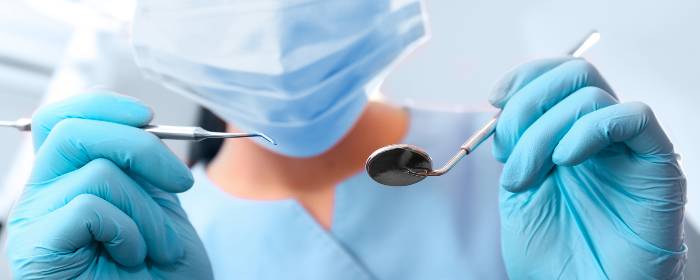
by admin | Sep 27, 2019 | Alzheimer’s Disease, Health Awareness
When it comes to chronic conditions like Alzheimer’s disease, experts are consistently exploring new research which could shed light on causative factors. The disease, as with many other serious illnesses, is believed to be caused by a combination of genetic, lifestyle, and environmental factors that impact the brain over time. Yet, researchers have recently discovered new findings involving gum bacteria and its potential role in Alzheimer’s, among other conditions. Neurodegenerative disease experts are debating one question: Could Alzheimer’s be linked to gum bacteria?
The Brain-Mouth Connection
According to an article published in Experimental Biology, bacteria involved in gum disease is suspected to have the ability to travel throughout the body. The bacterium, Porphyromonas gingivalis, is the key agent behind periodontitis and is believed to exude toxins connected to Alzheimer’s disease, rheumatoid arthritis, and aspiration pneumonia. Samples of these bacteria were found in the brains of individuals with Alzheimer’s, and researchers used animal studies to demonstrate how the bacterium can make its way from the mouth to the brain.
The bacteria were more common in the brain samples of Alzheimer’s patients compared to people without the disease of roughly the same age. Its key toxins, called gingipains, were present in these individuals. Based on animal studies, it appears that the migration of the bacteria from the mouth to the brain can be stopped with chemicals that interact with gingipains.
The Critical Importance of Oral Care
Dentists have long urged patients to take caution against periodontitis, the most serious form of gum disease. Left unaddressed, it can lead to tooth loss and can damage the soft tissue and bone that support the teeth. Yet, experts now believe that it can also have body-wide effects. Previous research has suggested that it the bacteria that causes the disease could travel through the bloodstream and cause other conditions, such as coronary artery disease or stroke. These newest findings suggest that proper dental care is especially important for individuals with genetic risk factors for Alzheimer’s disease or Rheumatoid Arthritis.
While gum disease is common, it’s often preventable. Although genetic factors may play a role in a person’s likelihood for developing periodontitis, there are many controllable factors which can also be addressed. Avoiding or quitting smoking, brushing and flossing regularly, and having dental cleanings at least once per year are some of the most effective strategies for avoiding gum disease and its potential complications.
Contact us at Stemedix to learn more about this and other promising studies!

by admin | Jul 29, 2019 | Exosomes, Mesenchymal Stem Cells
Periodontal disease, better known as gum disease, is very common. About half of all adults have chronic gum disease, and as many as 15% had severe periodontal disease. In periodontal disease, the gums become red and inflamed. The tissues that connect the tooth to the bone, such as the periodontal ligament, are damaged or destroyed. Chronic periodontal disease can even invade and destroy jaw bone. Making matters worse, as the gums recede, they can collect bacteria in spaces called periodontal pockets. Over time, these periodontal pockets can become dental abscesses. As the gums become more and more diseased, the affected tooth or teeth may fall out.
The treatment for periodontal disease varies depending on its severity. Good oral hygiene including regular brushing and flossing can reverse mild periodontitis. A dentist can deeply clean, probe and disrupt periodontal pockets. In more severe cases, topical antiseptics or oral antibiotics may be required. Less often, a dental surgeon must remove diseased areas of gum and bone.
Periodontitis usually chronic and causes significant ongoing inflammation. Thus, the gums take a long time to heal. In many cases, periodontal disease can be difficult to treat.
Fortunately, dental researchers have been exploring ways to use mesenchymal stem cells to help the healing process. More specifically, they have been using the exosomes released by mesenchymal stem cells. Exosomes are small packets of proteins, RNA, and other molecules that help promote growth and tissue regeneration. Since exosomes are not cells, they are much easier to collect, store, transport, and administer to patients. Most importantly, exosomes appear to contain all of the things that make stem cells so powerful in regenerative medicine.
In a 2019 study, Dr. Chew and colleagues used exosomes collected from mesenchymal stem cells to treat rats with periodontal disease. The researchers noticed that animals treated with exosomes healed much faster than untreated animals. Exosomes taken from mesenchymal stem cells promoted periodontal tissue regeneration helped grow new bone and regrew periodontal ligaments. The researchers also found that exosomes were able to recruit new cells to replace the damaged ones.
This scientific research is an exciting breakthrough in the fields of dentistry and periodontics. Chew and co-authors have shown that mesenchymal stem cell exosomes could enhance periodontal tissue regeneration without any adverse effects. The scientists go on to state that these findings will serve as the basis for future “cell-free” exosome treatments for periodontal disease. This is certainly good news for the more than 150 million Americans with periodontitis.
Reference: Chew, JRJ. et al. (2019). Mesenchymal stem cell exosomes enhance periodontal ligament cell functions and promote periodontal regeneration. Acta Biomaterialia. 2019 Apr 15;89:252-264.



 St. Petersburg, Florida
St. Petersburg, Florida
